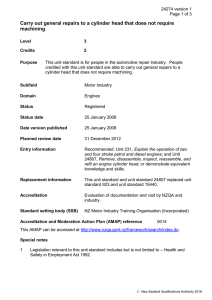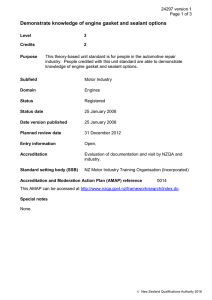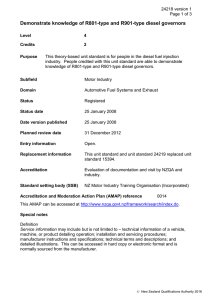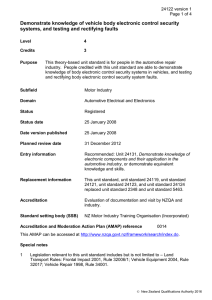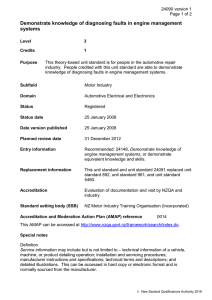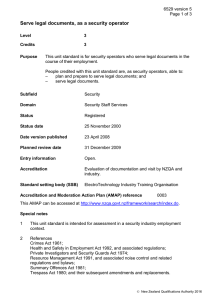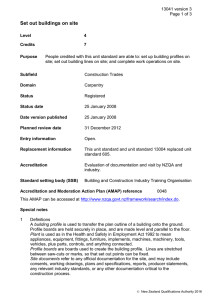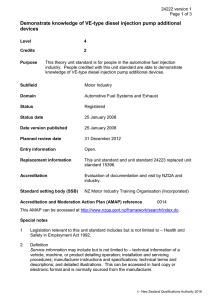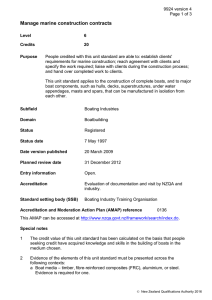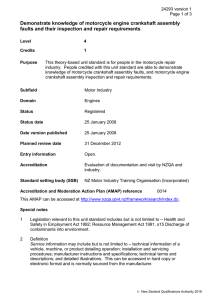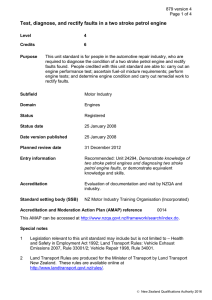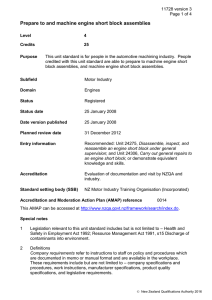Carry out general repairs to an engine short block
advertisement
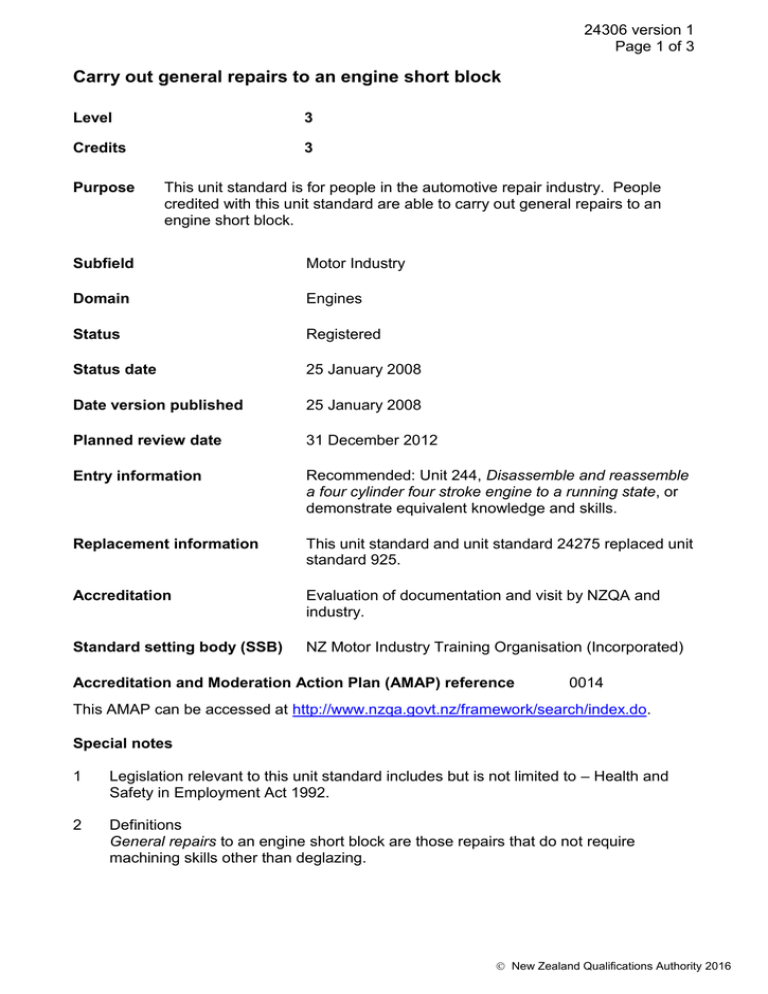
24306 version 1 Page 1 of 3 Carry out general repairs to an engine short block Level 3 Credits 3 Purpose This unit standard is for people in the automotive repair industry. People credited with this unit standard are able to carry out general repairs to an engine short block. Subfield Motor Industry Domain Engines Status Registered Status date 25 January 2008 Date version published 25 January 2008 Planned review date 31 December 2012 Entry information Recommended: Unit 244, Disassemble and reassemble a four cylinder four stroke engine to a running state, or demonstrate equivalent knowledge and skills. Replacement information This unit standard and unit standard 24275 replaced unit standard 925. Accreditation Evaluation of documentation and visit by NZQA and industry. Standard setting body (SSB) NZ Motor Industry Training Organisation (Incorporated) Accreditation and Moderation Action Plan (AMAP) reference 0014 This AMAP can be accessed at http://www.nzqa.govt.nz/framework/search/index.do. Special notes 1 Legislation relevant to this unit standard includes but is not limited to – Health and Safety in Employment Act 1992. 2 Definitions General repairs to an engine short block are those repairs that do not require machining skills other than deglazing. New Zealand Qualifications Authority 2016 24306 version 1 Page 2 of 3 Service information may include but is not limited to – technical information of a vehicle, machine, or product detailing operation; installation and servicing procedures; manufacturer instructions and specifications; technical terms and descriptions; and detailed illustrations. This can be accessed in hard copy or electronic format and is normally sourced from the manufacturer. 3 This unit standard can be assessed against in conjunction with Unit 24275, Disassemble, inspect, and reassemble an engine short block under general supervision. Elements and performance criteria Element 1 Carry out general repairs to an engine short block. Performance criteria 1.1 Safe working practices are observed throughout the task in accordance with legislative requirements. Range personal safety, safety of others, engine safety, workshop safety, environmental safety, tools and equipment safety. 1.2 Suitable tools and equipment are selected and used to enable general repairs to be carried out in accordance with service information. 1.3 The cylinder bores are deglazed and prepared in accordance with service information. Range deglazing includes – measuring, meeting clearances and tolerances, cleaning; eglazing process includes – bores suitable and recommended by the manufacturer for deglazing, glazing equipment selected, feed and speed determined, glazing lubrication selected and used, cross hatch pattern established, post glazing cleaning completed, bores lubricated. 1.4 Faulty piston assemblies are replaced to meet manufacturer specifications and to match the size of the cylinder bores. 1.5 Piston rings are replaced in accordance with service information. 1.6 Crankshaft and connecting rod bearings, crankshaft thrusts (where fitted), and seals, are replaced in accordance with service information. 1.7 Faulty crankshaft assemblies are replaced to meet manufacturer specifications. 1.8 Faulty timing gears, water pump, and oil pump are replaced to meet manufacturer specifications. New Zealand Qualifications Authority 2016 24306 version 1 Page 3 of 3 1.9 Leaking core plugs are removed and replaced in accordance with service information. 1.10 Clogged threads are cleaned out, and broken studs are replaced in accordance with service information. 1.11 Components are assembled to the block in accordance with service information. Please note Providers must be accredited by NZQA, or an inter-institutional body with delegated authority for quality assurance, before they can report credits from assessment against unit standards or deliver courses of study leading to that assessment. Industry Training Organisations must be accredited by NZQA before they can register credits from assessment against unit standards. Accredited providers and Industry Training Organisations assessing against unit standards must engage with the moderation system that applies to those standards. Accreditation requirements and an outline of the moderation system that applies to this standard are outlined in the Accreditation and Moderation Action Plan (AMAP). The AMAP also includes useful information about special requirements for organisations wishing to develop education and training programmes, such as minimum qualifications for tutors and assessors, and special resource requirements. Comments on this unit standard Please contact the NZ Motor Industry Training Organisation (Incorporated) info@mito.org.nz if you wish to suggest changes to the content of this unit standard. New Zealand Qualifications Authority 2016
